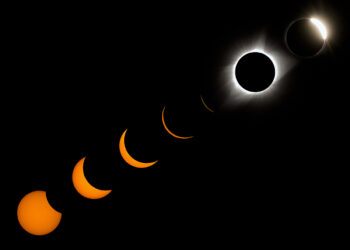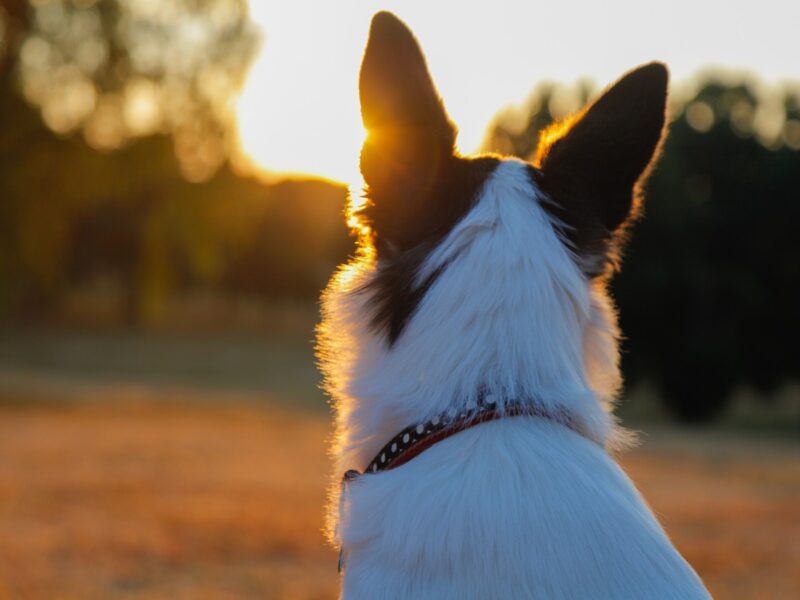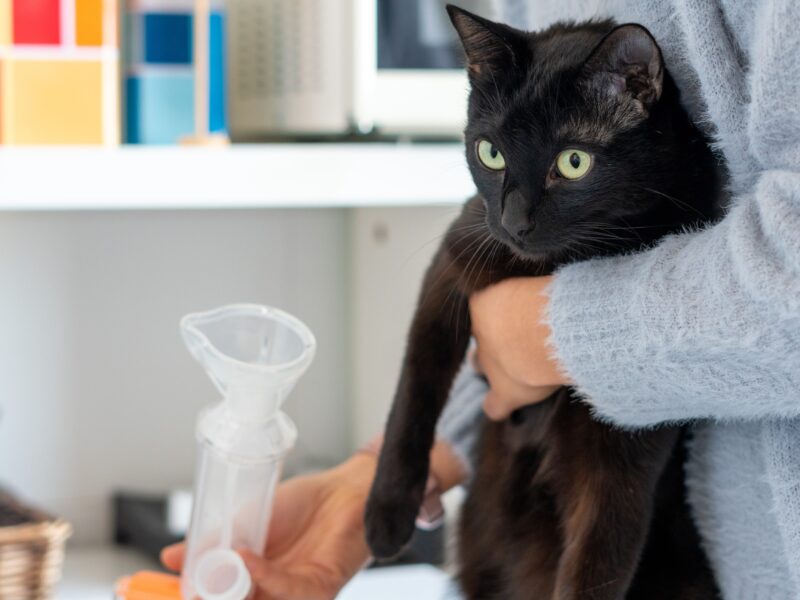Pets And The Solar Eclipse

On Monday, 13 states in the U.S. — starting with Texas — will experience brief moments of nighttime darkness mid-day as the moon glides in front of the sun, blocking its rays.
A solar eclipse, while fascinating to witness, raises important safety considerations, not just for humans but also for our beloved animals.
Dr. Kristina Paradowski and Dr. Isabelle Louge, clinical assistant professors at the Texas A&M School of Veterinary Medicine and Biomedical Sciences, provide insight into animals’ reactions during eclipses and offer guidance on how owners can ensure their animals’ safety and comfort.
Unusual Reactions
During a solar eclipse, pets may display unusual behaviors because, like humans, they are accustomed to being active during daylight hours and resting at night. The darkness caused by an eclipse can disrupt their internal clocks, leading to confusion and anxiety.
“The sudden increase in darkness during what should be the middle of the day is puzzling and disorienting for pets,” Paradowski said. “Often, when darkness quickly increases during what should be daylight, storms follow. As a result, there may be a conditioned response in some animals to be expecting storms when the day suddenly darkens. This can be especially true in animals with storm anxiety.”
Those with a history of anxiety or storm anxiety may exhibit additional behaviors such as whining, pacing, panting or hiding.

Because pets are creatures of habit, they rely on consistent routines related to feeding, playing and resting. Paradowski noted that when the sudden darkness of a solar eclipse mimics nighttime, pets also may interpret this change as a signal to start their evening routines, such as seeking out food early or looking for a place to sleep.
“Some animals rely even more heavily on light cues; birds are one example,” Paradowski said. “If a pet bird is out of its cage, it may go back in and find its perch as if it is nighttime. Pet birds in the path of totality will likely be more vocal in periods prior to and after the eclipse, but silent during the peak eclipse.”
Paradowski strongly encourages owners to maintain their pet’s daily routine or interactions so that they can feel a sense of normalcy and comfort during the eclipse, reducing the likelihood of stress or anxiety-related behaviors.
However, if pets are exhibiting unusual behaviors, owners can provide them with additional comfort and reassurance.
“If pets are hiding, they may be too scared to interact, and forcing interaction may make them more nervous,” Paradowski said. “For pets who are food-motivated, you can always gently talk to them, pet them, and give them their favorite snack as a distraction. Those who are too stressed to eat may crave physical touch, so you can calmly sit with, talk to, and pet them.”
Safety Tips
Although humans are advised to wear special viewing glasses to protect their eyes during the eclipse, Paradowski pointed out that there is not much research to support information on pet eye safety during an eclipse.
“Lucky for us, they usually will not stare up into the sky simply out of curiosity,” Paradowski said. “They may see us looking into the sky and follow our gaze to see what we are looking at, so if you have a pet with you, try not to look too long.”
Major cities in the path of totality are expecting large numbers of people, which can lead to increased noise, crowds and unfamiliar activity. These changes in the environment can be particularly unsettling for pets.
“I would not recommend taking pets to any eclipse viewing events,” Paradowski said. “These will be very crowded and may increase anxiety even further. This is especially true if your pet is not used to large events, other pets or people.

“Cats should also be kept indoors during the event because of increased traffic on the roads, which increases the risk of accidents and trauma,” Paradowski said. “Keeping cats indoors will limit their exposure to other cats as well since some cats express anxiety through aggression, increasing the chance of fighting.”
Some communities — such as Bell County in Central Texas — are declaring a state of emergency in anticipation of large crowds of sky watchers and encourage local residents to stay home due to crowds and traffic. In these cases, Paradowski emphasizes the need to include pets during this planning.
“You should make sure that you have enough food, water, treats, medications, litter, toys and anything else you may need to last for one to two weeks, as sudden increases in population along the path of totality may lead to shortages in these items,” Paradowski said. “This also applies if you are traveling somewhere with your pet for the eclipse.”
Large Animal Care
Though unpredictable, the reactions from large animals primarily kept outside without a lot of exposure to artificial lights — such as cattle, horses and other herd animals — can include confused, spooked, erratic or frozen during the eclipse, Louge noted. Because of the short duration of totality, large animals may have no reaction at all.
“Ideally, large animals should be kept in a familiar environment because it will be easier for them to navigate as the light dims,” Louge said. “In case the animals are spooked during the rapid change in light, owners should keep them in areas free of hazards like ravines, potholes or other things that could trip or injure them.”
Louge also advises owners to keep a safe distance from herds and avoid working with them, as their behavior may become more erratic. To avoid additional injuries, it’s important that owners do not expose their animals to loud noises or flashes of light during the eclipse’s darkness that could otherwise spook them.
The eclipse is a rare event that many are excited to experience, but owners should be mindful of their animals’ well-being and take precautions to ensure their safety, allowing them to enjoy the spectacle without any harm or stress.
Media contact: Jennifer Gauntt, jgauntt@cvm.tamu.edu





